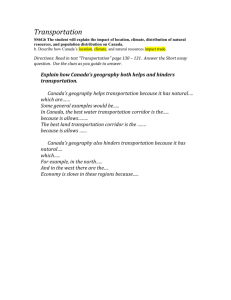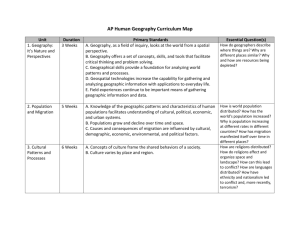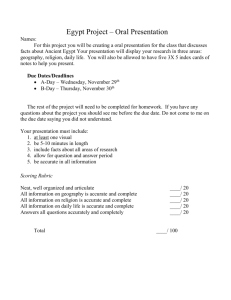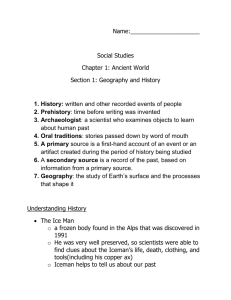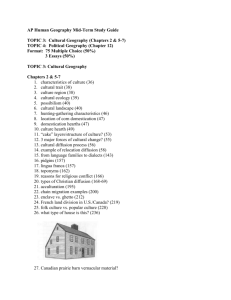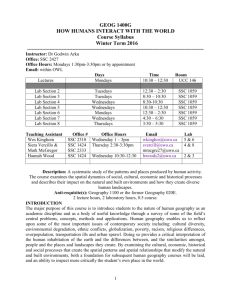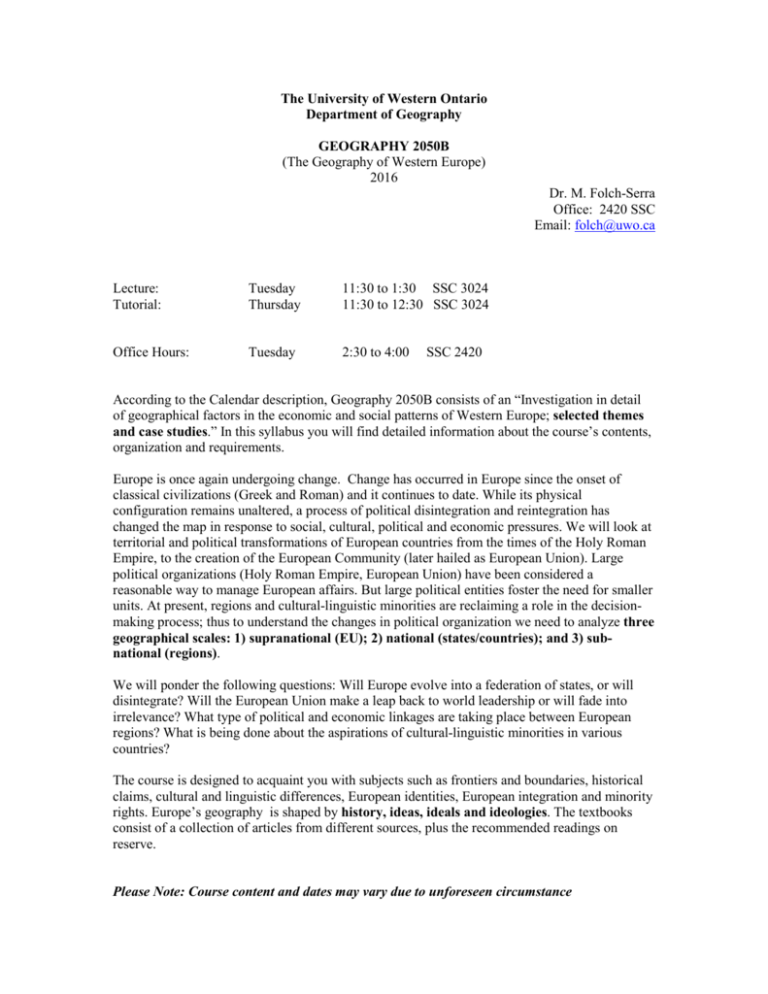
The University of Western Ontario
Department of Geography
GEOGRAPHY 2050B
(The Geography of Western Europe)
2016
Dr. M. Folch-Serra
Office: 2420 SSC
Email: folch@uwo.ca
Lecture:
Tutorial:
Tuesday
Thursday
11:30 to 1:30 SSC 3024
11:30 to 12:30 SSC 3024
Office Hours:
Tuesday
2:30 to 4:00
SSC 2420
According to the Calendar description, Geography 2050B consists of an “Investigation in detail
of geographical factors in the economic and social patterns of Western Europe; selected themes
and case studies.” In this syllabus you will find detailed information about the course’s contents,
organization and requirements.
Europe is once again undergoing change. Change has occurred in Europe since the onset of
classical civilizations (Greek and Roman) and it continues to date. While its physical
configuration remains unaltered, a process of political disintegration and reintegration has
changed the map in response to social, cultural, political and economic pressures. We will look at
territorial and political transformations of European countries from the times of the Holy Roman
Empire, to the creation of the European Community (later hailed as European Union). Large
political organizations (Holy Roman Empire, European Union) have been considered a
reasonable way to manage European affairs. But large political entities foster the need for smaller
units. At present, regions and cultural-linguistic minorities are reclaiming a role in the decisionmaking process; thus to understand the changes in political organization we need to analyze three
geographical scales: 1) supranational (EU); 2) national (states/countries); and 3) subnational (regions).
We will ponder the following questions: Will Europe evolve into a federation of states, or will
disintegrate? Will the European Union make a leap back to world leadership or will fade into
irrelevance? What type of political and economic linkages are taking place between European
regions? What is being done about the aspirations of cultural-linguistic minorities in various
countries?
The course is designed to acquaint you with subjects such as frontiers and boundaries, historical
claims, cultural and linguistic differences, European identities, European integration and minority
rights. Europe’s geography is shaped by history, ideas, ideals and ideologies. The textbooks
consist of a collection of articles from different sources, plus the recommended readings on
reserve.
Please Note: Course content and dates may vary due to unforeseen circumstance
DATE 2016
LECTURE TOPIC
ASSIGNED READINGS
EUROPE’S HISTORICAL GEOGRAPHY (Background)
Jan 5
Jan 12
Jan19
Jan 26
Feb. 2
Feb. 9
Feb. 15-21
Feb. 23
Introduction: Discussing the course content
What is Europe? From the physical landscape
to the classical civilizations
A geography of economic organization and
religion
Boundary change and creation of new states:
from the 16th to the 19th centuries
Europe’s geography of race: the colonial
enterprise
European Enlightenment: a geographical
diffusion of European ideas and ideals
READING WEEK
MID-TERM EXAMINATION
‘The limits of Europe’
‘Physical Geography of
Europe’
‘Europe as a Culture realm’
‘Capturing Europa: Images,
Narratives, Maps’
‘The Cartographic
Construction of Race and
Identity’
‘The Political Landscape’
EUROPES’S CONTEMPORARY GEOGRAPHY
March 1
March 8
March 15
March 22
March 29
April 5
Cold War, the Berlin Wall and its
consequences
The European Union: a confederation of 28
countries
An urban geography of the EU
‘The Cold War and the
Triumph of Geopolitics’
‘The European Union’
Tourism and mobility in the European
landscape
Europe’s cultural geography: Food, Wine and
Identity
‘A Grand Tour through
European Tourism’
‘Europe’s changing Social
and Ethnic Geography’ &
‘European Identity’
‘Europe Defined’
Europe defined: a review
‘A Europe of the Cities?’
(Subject to minor changes)
Required reading:
Geography 2050B, Western Europe, collated by Dr. M. Folch-Serra (Reader)
Recommended:
The Dictionary of Human Geography, Fifth Edition, edited by R.J. Johnston, D. Gregory & D.M.
Smith. Oxford UK & Cambridge US: Blackwell
2
The Ethnopolitical Encyclopaedia of Europe, 2004. Edited by Karl Cordell and Stefan
Wolff. Houndmills, Basingstoke, Hampshire; New York: Palgrave Macmillan.
Ezrow, Natasha M. 2011 Dictators and dictatorships: understanding authoritarian regimes and
their leaders. New York: Continuum
Paxton, Robert O. 2012 Europe in the twentieth century. Boston, MA: Wadsworth/Cengage
Learning
Williamson, D. G. 2007 The age of the dictators: a study of the European dictatorships,
1918-53. Harlow, U.K.; New York: Pearson Longman
Rifkin, Jeremy 2004 The European Dream. New York: Tarcher/Penguin
EXAMINATION
The Midterm examination will be given on February 23 (two hours) in the classroom. A make-up
examination will only be granted on documented compassionate grounds. You will need to fillin the forms available at the Student Development Center, SSC Room 2105.
The final examination will be given on the date and time determined by the University (three
hours). It will consist of short and long questions encompassing all course material. The above
instructions for make-up examinations apply.
No electronic devices will be allowed during tests and examinations.
COURSE REQUIREMENTS:
1) Completion of required readings
2) Completion of assignment
MARKING SCHEME:
1) ASSIGNMENT
2) MIDTERM EXAMINATION
3) FINAL EXAMINATION
33%
30%
37%
TUTORIALS: Thursday from 11:30 to 12:30
Room SSC3024
Tutorial schedule:
Jan 14
Discussing the readings
Jan 21
Film and discussion
Jan 28
Choosing the assignment
Feb 4
Debate on the readings
Feb 11
Debate on the readings
March 3
Film and discussion
March 10
Discussing the assignment
March 17
Film
March 24
Exam preparation
NOTE: tutorials are not given every week
3
ASSIGNMENT
(All courses must have a written component)
The objective of the Assignment is to hone your writing skills, creative capability, and critical
insight.
“The UK (or Spain, or Belgium, etc.) is not an immutable fact of nature; it is a human design that
can be un-designed when the circumstances that gave rise to it no longer obtain”
The above statement reflects the 21st century reality of Western Europe. Why are regional
nationalisms threatening to change the GEOGRAPHY of old Western European nations?
Scotland, for example, came close to choosing independence from the UK in the 2014
referendum that would have changed the makeup of the United Kingdom to the 1603 Union of
Crowns. Wales wants more autonomy. Catalonia emphasizes its distinctive language and
institutions in opposition to Spanish centralism. Basque nationalism also remains powerful in
Spain. Nationalism has brought Belgium to the verge of breakup with Flanders threat of
separation. France is the exception, where regional nationalism has been methodically
discouraged.
To begin to understand the changing geography of contemporary Western Europe, we must revise
the historical roots of modern regional nationalism, the roles of language and institutions over
long periods of time, then focus on the situations of today.
You need to read Stateless nations… and choose one of the examples of regional nationalism
explained in the book. You are requested to write a brief summary of 5 pages on your chosen
region, and then expand the argument with two more sources from other authors about the same
subject for a total of 9 pages maximum (plus bibliography, maps and notes).
TITLE: Stateless Nations: Western European regional nationalisms and the old nations
LOCATION Online [electronic resource]
AUTHOR
Friend, Julius Weis.
IMPRINT
Houndmills, Basingstoke, Hampshire; New York: Palgrave Macmillan, 2012.
DESCRIPT 1 online resource (viii, 212 p.)
NOTE
Includes bibliographical references (p. 169-194).
(INSTRUCTIONS ABOUT STYLE, PAGE #, ETC. will be explained in tutorials)
The due date for the Assignment is March 22 during the lecture hour.
There are no extensions; assignments not handed on that date will not be marked.
Important NOTE: The electronic book (above) cannot be accessed by several students at the same
time. Make sure to select your topic well in advance and paste it into your own device until the
time to write the assignment. So you have it ready when you need it.
4
Marking scheme:
Your evaluation is based primarily on your ability to fulfill the objectives of the course as
evidenced in the assignment, and final exam. The grades will reflect the following: the mark of
'C' (60%-69%) is indicative of average work, both competent and acceptable. You have
completed all of the assignments and readings and demonstrated a general understanding of the
course material as evidenced in the oral presentation, written assignment, mid-term examination
and final exam. A grade of 'B' (70%-79%) reflects evidence of an above average effort and
performance. Not only have you fulfilled the assignments in a more meticulous fashion, you
have demonstrated a more thorough understanding of the material and gone a few extra steps
beyond the average student as evidenced on the tests and in your written work. An 'A' (80%89%) is reserved for outstanding effort and achievement. Exceptional diligence, a thorough
knowledge of the course material, and the ability to apply and convey concepts in an effective,
logical and literate fashion are clearly evident. Hard work and exceptional effort are necessary
but not, by themselves, sufficient to warrant an ‘A.’ An 'A+' (90 %+) is extremely rare. An
exceptionally outstanding performance on the examination, and essay demonstrating a superb
command of English and a critical mind capable of synthesizing complex facts and ideas to arrive
at particularly astute conclusions, will earn this prestigious grade.
NOTE ABOUT EMAILS:
If you have questions about the report or the lectures, I will be available to answer them during
my office hours. The use of email is limited to extensions or to make an appointment different
from office hours. I will answer emails during office hours, not on weekends. I do not discuss
marks in emails. Please note: any consultation about reports, exams, or content of lectures,
readings and the like, have to be done in person after or during class or in office hours.
IMPORTANT REMINDERS:
Support Services: Registrarial Services: http://www.registrar.uwo.ca/ -- Student Development
Services: http://www.sdc.uwo.ca/
Requests for a final mark revision have to be done according to Calendar’s rules
regulations and timetable. The request has to be in written form, specific and must
enumerate the points of contention.
a) Your course mark is only final when you receive it from the Registrar, and even then it can be
changed on receipt by the Registrar of a Marks Revision Form. In all cases the final marks are
not final until the department chair has signed off.
b) Make-up dates will only be granted upon receipt of certified medical causes or bereavement.
For further details consult the Academic Calendar. Your documents need to be presented at the
office of Academic Counselling Student Centre, SSC 2105, and SSC 2114. UWO Policy on
Accommodation for Medical Illness:
http://www.uwo.ca/univsec/pdf/academic_policies/appeals/accommodation_medical.pdf
Downloadable Student Medical Certificate (SMC):
http://www.uwo.ca/univsec/pdf/academic_policies/appeals/medicalform.pdf.
c) Non-medical absences from midterms, tutorials, laboratory experiments, or late essays or
assignments, will only be considered upon receipt of certified bereavement. For further details
5
consult the Academic Calendar. Your documents need to be presented at the office of Academic
Counselling Student Centre, SSC 2105, and SSC 2114.
d) Accommodation for medical illness of work worth less than 10% of the total course grade will
be granted and no medical documentation for such accommodation will be required.
APPEALS, PLAGIARISM, DROPS, EXTENSIONS, EXEMPTIONS & LATE
PENALTIES: You are advised to read the course calendar to familiarize yourself with the
university's regulations and procedures concerning appeals (‘relief’), plagiarism and penalties.
Should you feel your final grade in the course is biased, inaccurate or unfair you have the right to
appeal your mark. Be aware that marks may be raised--as well as lowered--- through an appeal
process. Please refer to the Western Calendar prior to doing so. Plagiarism in all its forms is, of
course, unacceptable and those who tempt fate will be persecuted to the fullest extent allowed
under the university's regulations.
Statement on Academic Offences
Scholastic offences are taken seriously and students are directed to read the appropriate policy,
specifically, the definition of what constitutes a Scholastic Offence, at the following Web site:
http://www.uwo.ca/univsec/pdf/academic_policies/appeals/scholastic_discipline_undergr
ad.pdf
If you or someone you know is experiencing distress, there are several resources here at Western
to assist you. Please visit http://www.uwo.ca/uwocom/mentalhealth/ for more information on
these resources and on mental health.
6


